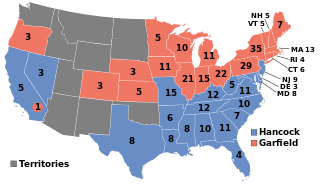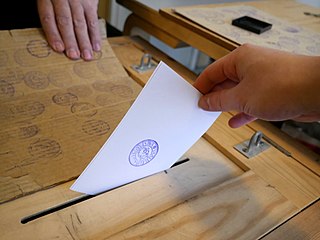This article needs additional citations for verification .(October 2021) |
These are some of the notable events relating to politics in 2012. [1]
This article needs additional citations for verification .(October 2021) |
These are some of the notable events relating to politics in 2012. [1]

The 1876 United States presidential election was the 23rd quadrennial presidential election, held on Tuesday, November 7, 1876. Incumbent Republican president Ulysses S. Grant declined to run for a third term, so the party chose Rutherford B. Hayes, the governor of Ohio, as its nominee. The Democratic Party nominated New York governor Samuel J. Tilden as their nominee. It was one of the most contentious presidential elections in American history. Its resolution involved negotiations between the Republicans and Democrats, resulting in the Compromise of 1877, and on March 2, 1877, the counting of electoral votes by the House and Senate occurred, confirming Hayes as president. It was the second of five U.S. presidential elections in which the winner did not win a plurality of the national popular vote. This is the first time it happened since 1824. Following President Grant's decision to retire after his second term, U.S. Representative James G. Blaine emerged as the frontrunner for the Republican nomination. However, Blaine was unable to win a majority at the 1876 Republican National Convention, which settled on Governor Hayes of Ohio as a compromise candidate. The 1876 Democratic National Convention nominated Governor Tilden of New York on the second ballot.

The 1788–89 United States presidential election was the first quadrennial presidential election. It was held from Monday, December 15, 1788, to Wednesday, January 7, 1789, under the new Constitution ratified that same year. George Washington was unanimously elected for the first of his two terms as president and John Adams became the first vice president. This was the only U.S. presidential election that spanned two calendar years without a contingent election and the first national presidential election in American history.

The 1880 United States presidential election was the 24th quadrennial presidential election, held on Tuesday, November 2, 1880, in which Republican nominee James A. Garfield defeated Winfield Scott Hancock of the Democratic Party. The voter turnout rate was one of the highest in the nation's history. Garfield was assassinated during his first year in office, and he was succeeded by his vice president, Chester A. Arthur.

The Government of Ghana was created as a parliamentary democracy, followed by alternating military and civilian governments in Ghana. In January 1993, military government gave way to the Fourth Republic after presidential and parliamentary elections in late 1992. The 1992 constitution divides powers among a president, parliament, cabinet, council of state, and an independent judiciary. The government is elected by universal suffrage.

A presidential election is the election of any head of state whose official title is President.
The elections in Taiwan each held every four years, typically in January and November. Since 2012 the previously eleven types of elections in Taiwan have been unified into general and local elections. There may also be by-elections. Electoral systems include first-past-the-post, proportional representation, single non-transferable voting, and a parallel mixture of the above.

Burkina Faso elects on the national level a head of state – the president – and a legislature. The president is elected for a five-year term by the people. The National Assembly has 127 members, elected for a five-year term by proportional representation. Burkina Faso has held democratic elections since 1965. The history of elections has been slightly inconsistent, with the government dynamically changing at the hands of various coups, constitutional changes, and boycotts from various political parties. In 2015, the country experienced its first peaceful and fair election ever. Corruption plagued Burkina Faso's presidential elections for 50 years, but following a coup overthrowing Blaise Compaoré, the nation has seen more democratic and less corrupt electoral processes. Terrorism has played a substantial role in Burkina Faso's elections, with candidates running on the promise to keep the nation safe from the rise of Islamic jihadism they experienced in the 2010s. Historically, a few different parties have held power in Burkina. The Organization for Popular Democracy – Labour Movement was former president Compaoré's party affiliation, and thus they held power from 1987 to 2014. His party took power through a coup, and in 2014 also lost their control when the Regiment of Presidential Security overthrew the government.

Elections in Nigeria involve choosing representatives to the federal government of Nigeria and the various states in the fourth republic Nigeria. Elections in Nigeria began in 1959 with a number of political parties. It's a method of choosing leaders where the citizens have right to vote and to be voted for. For 2023, Nigerians are getting ready for presidential elections with about 93.4 million eligible voters across the federation for the 25 February election.
These are some of the notable events relating to politics in 2008:

The election of the president and the vice president of the United States is an indirect election in which citizens of the United States who are registered to vote in one of the fifty U.S. states or in Washington, D.C., cast ballots not directly for those offices, but instead for members of the Electoral College. These electors then cast direct votes, known as electoral votes, for president, and for vice president. The candidate who receives an absolute majority of electoral votes is then elected to that office. If no candidate receives an absolute majority of the votes for president, the House of Representatives elects the president; likewise if no one receives an absolute majority of the votes for vice president, then the Senate elects the vice president.

The 2012 United States presidential election in California took place on November 6, 2012, as part of the 2012 United States presidential election in which all 50 states plus the District of Columbia participated. California voters chose 55 electors, the most out of any state, to represent them in the Electoral College via a popular vote pitting incumbent Democratic President Barack Obama and his running mate, Vice President Joe Biden, against Republican challenger and former Massachusetts Governor Mitt Romney and his running mate, Congressman Paul Ryan.

The 2012 United States presidential election in the District of Columbia took place on November 6, 2012, as part of the 2012 United States presidential election in which all 50 states and the District of Columbia participated. D.C. voters chose three electors to represent them in the Electoral College via a popular vote pitting incumbent Democratic President Barack Obama and his running mate, Vice President Joe Biden, against Republican challenger and former Massachusetts Governor Mitt Romney and his running mate, Congressman Paul Ryan. Prior to the election, Washington DC was considered to be a definite win for Obama; the nation's capital is heavily Democratic and has always voted for Democratic nominees for president by overwhelming margins.

The United States elections of 1788–1789 were the first federal elections in the United States following the ratification of the United States Constitution in 1788. In the elections, George Washington was elected as the first president and the members of the 1st United States Congress were selected.

The 2016 United States presidential election in Illinois was held on Tuesday, November 8, 2016, as part of the 2016 United States presidential election in which all 50 states plus the District of Columbia participated. Illinois voters chose electors to represent them in the Electoral College via a popular vote, pitting the Republican Party's nominee, businessman Donald Trump, and running mate Indiana Governor Mike Pence against Democratic Party nominee, former Secretary of State Hillary Clinton, and her running mate Virginia Senator Tim Kaine. Illinois had 20 votes in the Electoral College.

The 2016 United States presidential election in Pennsylvania took place on November 8, 2016, as part of the 2016 United States elections in which all 50 states and the District of Columbia participated. Pennsylvania voters chose electors to represent them in the Electoral College via a popular vote.

The 2024 United States presidential election in Connecticut is scheduled to take place on Tuesday, November 5, 2024, as part of the 2024 United States elections in which all 50 states plus the District of Columbia will participate. Connecticut voters will choose electors to represent them in the Electoral College via a popular vote. The state of Connecticut has seven electoral votes in the Electoral College, following reapportionment due to the 2020 United States census in which the state neither gained nor lost a seat.

The 2024 United States presidential election in Iowa is scheduled to take place on Tuesday, November 5, 2024, as part of the 2024 United States elections in which all 50 states plus the District of Columbia will participate. Iowa voters will choose electors to represent them in the Electoral College via a popular vote. The state of Iowa has six electoral votes in the Electoral College, following reapportionment due to the 2020 United States census in which the state neither gained nor lost a seat.

The 2024 United States presidential election in New Hampshire is scheduled to take place on Tuesday, November 5, 2024, as part of the 2024 United States elections in which all 50 states plus the District of Columbia will participate. New Hampshire voters will choose electors to represent them in the Electoral College via a popular vote. The state of New Hampshire has four electoral votes in the Electoral College, following reapportionment due to the 2020 United States census in which the state neither gained nor lost a seat.

The 2024 United States presidential election in South Carolina is scheduled to take place on Tuesday, November 5, 2024, as part of the 2024 United States elections in which all 50 states plus the District of Columbia will participate. South Carolina voters will choose electors to represent them in the Electoral College via a popular vote. The state of South Carolina has nine electoral votes in the Electoral College, following reapportionment due to the 2020 United States census in which the state neither gained nor lost a seat.

This national electoral calendar for 2023 lists the national/federal elections held in 2023 in all sovereign states and their dependent territories. By-elections are excluded, though national referendums are included.